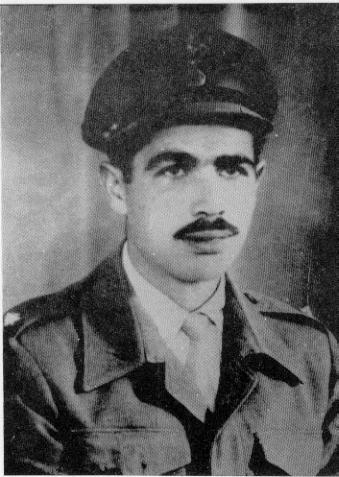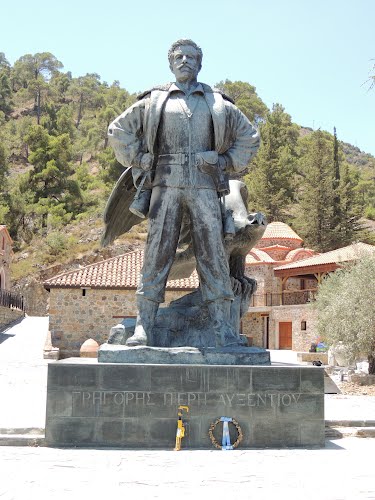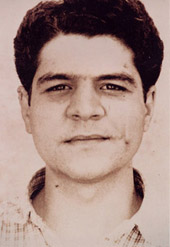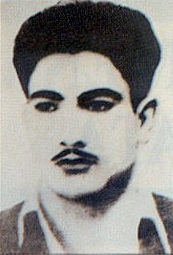<Back to Index>
- Independence Fighter Grigoris Pieris Afxentiou (Γρηγόρης Πιερής Αυξεντίου), 1928
- Freedom Fighter Iakovos Patatsos (Ιάκωβος Πατάτσος), 1928
- Freedom Fighter Charilaos Michail (Χαρίλαος Μιχαήλ), 1935
PAGE SPONSOR


Grigoris Pieris Afxentiou (Greek: Γρηγόρης Πιερής Αυξεντίου; 22 February 1928 - 3 March 1957) was a guerrilla fighter who fought against the British rule of Cyprus and is considered a national hero. In the hierarchy of EOKA he was second in command to general Georgios Grivas. His nom - de - guerre was Zedhros (Ζήδρος).
Afxentiou was born in the village of Lyssi in Mesaoria, Famagusta District on February 22, 1928 to Pieris and Antonia Afxentiou. He had a younger sister called Chrystala. He attended Lyssi primary school and received his secondary education at the Hellenic Gymnasium in the nearest city, Famagusta. Reports by those who knew him were that he was a keen sportsman and passionate about football. He supported Anorthosis one of the strongest clubs in Famagusta.
He left for Greece where he was unsuccessful in gaining a place at the Hellenic Military Academy in Athens. In December 1949 he joined the Hellenic Army as a volunteer. From March to October 1950, he attended a reserve officer’s academy on the island of Syros. He then served with the Hellenic Army on the Greek-Bulgarian frontier, as a second lieutenant, before returning to Cyprus and joining the EOKA struggle.
He was discharged from the ranks of the Greek Army on November 15,
1953 and returned to Cyprus where he helped his father
with his business by working as a taxi driver. At that
time he also got engaged to be married.
Afxentiou joined the National Organization of Cypriot Fighters (EOKA) where he soon became Second in Command, adjutant to EOKA leader George Grivas. He was originally assigned the regional command of the district of Famagusta which he knew well. It was Grigoris Afxentiou who first thought of obtaining explosives from the sea bed, in shallow waters off the coast of Famagusta, as used by local fishermen to dynamite fish. Explosives were made from the surplus shells dumped in the sea by the British Army at the end of Second World War. Afxentiou was well liked by his peers and it did not take long for General Grivas to promote him to Commander of the Kyrenia district.
In the spring of 1955, he conducted attacks against the British controlled Cyprus Broadcasting Corporation and the electricity company in Nicosia. Known by the code name Zidros (Ζήδρος), since the day of his attacks, he was top of the British list of most wanted men. They initially proclaimed a reward of £250 for his arrest, which was soon raised to £1,000, and then £5,000 pounds sterling for blowing up British property.
When the reward was proclaimed, he went into hiding in the Pentadactylos mountain range where he trained EOKA fighters on weapon use and guerrilla warfare. He was very active in the Pentadaktylos range as well as Mount Troodos.
During October, 1955, on the day after Field Marshal Harding's arrival on Cyprus Afxentiou raided Lefkoniko Police Station, in broad daylight, and seized the entire armory that was stored there. Although the raid was planned well in advance it clearly appeared as a challenge to the Field Marshal's authority who thereafter pursued Afxentiou zealously.
In December, 1955, Afxentiou was relocated on orders of General Grivas to the Troodos mountain range and the General's hideout at Spilia, which led to Afxentiou's involvement in the Battle of Spilia.
On March 3, 1957, after an informant had betrayed his
location, the British forces surrounded Afxentiou outside
his secret hideout near the Machairas Monastery.
At the time, inside the hideout were Afxentiou and four
fellow guerrilla fighters. Realising he was outnumbered,
Afxentiou ordered his comrades to surrender but stayed
behind to fight to the death. The British asked
Afxentiou to surrender his arms but he replied "Molon
labe" (trans. "come and take them") quoting King Leonidas
of Sparta at Thermopylae. Unable to drive him out and
after sustaining casualties, the British forces resorted
to pouring petrol into his hideout and lighting it,
burning him alive. In fear of a popular uprising, the
British buried his scorched body at the Imprisoned Graves,
in the yard of the Central Jail
of Lefkosia, where he lies today.

Iakovos Patatsos was a Cypriot guerilla fighter during the EOKA struggle against the British from 1955 until 1959.
Patatsos was born in Lefkosia on July 1, 1934. He worked in a printing press and joined EOKA early in the struggle.
On April 23, 1956, Patatsos and a companion went into the Turkish sector of Lefkosia on a mission to kill an informer. The mission failed and Patatsos was seized by Turkish Cypriot Police Constable Nihat Basif. The companion shot Basif dead and escaped but Patatsos himself was attacked by Turkish Cypriot passers-by who beat him mercilessly and then surrendered him to the British.
Patatsos was convicted of Basif's murder and hanged,
along with Andreas Zakos and Charilaos Michail, on August 9,
1956. The three men were buried in the Central
Jail of Lefkosia.

Charilaos Michail was a Cypriot EOKA fighter during the 1955 - 1959 struggle against the British.
Michail was born on February 9, 1935, in the village of Galini, Lefkosia province. He worked in Cyprus Metallurgical Works when the struggle broke out and he joined EOKA together with his father and some of his brothers. On December 15, 1955, his group joined Markos Drakos' team for an ambush against a British detachment, led by Major B.J. Coombe, near Mersinaki, close to ancient Soloi. In the ensuing battle of Soloi, Michail was captured by the British. He had had a chance to escape but would not abandon his friend, Andreas Zakos, who was injured during the battle.
Michail was convicted by the British colonial court and sentenced to death. He was executed by hanging on August 9, 1956, along with his friend Andreas Zakos and Iakovos Patatsos, who was captured in a separate incident, The three men are buried in the Imprisoned Tombs of the Central Jail of Nicosia.